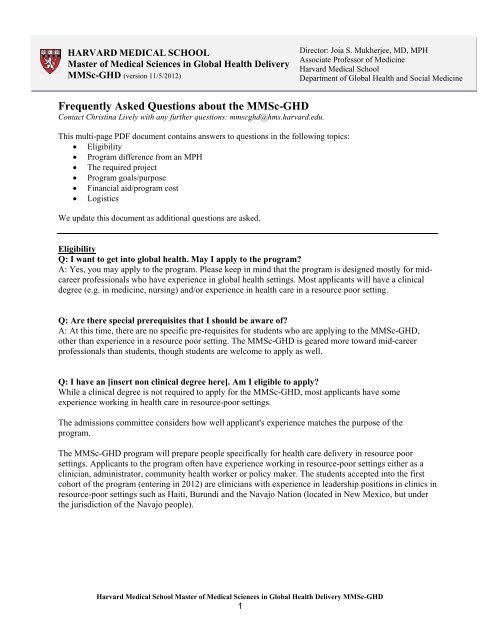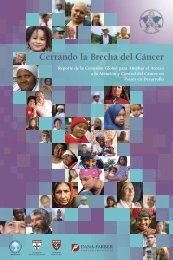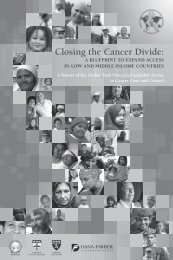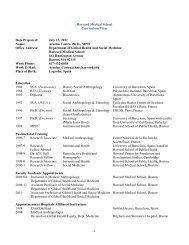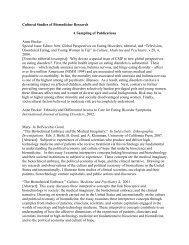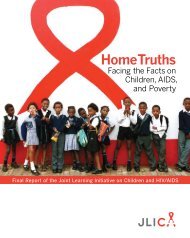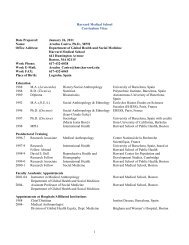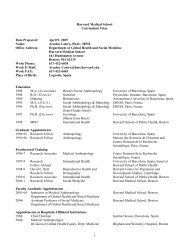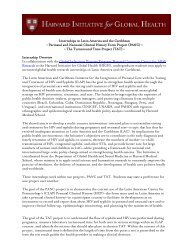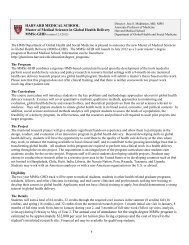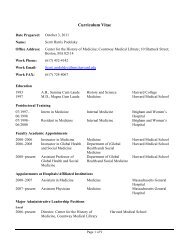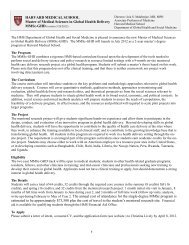Frequently Asked Questions about the MMSc-GHD
Frequently Asked Questions about the MMSc-GHD
Frequently Asked Questions about the MMSc-GHD
You also want an ePaper? Increase the reach of your titles
YUMPU automatically turns print PDFs into web optimized ePapers that Google loves.
HARVARD MEDICAL SCHOOL<br />
Master of Medical Sciences in Global Health Delivery<br />
<strong>MMSc</strong>-<strong>GHD</strong> (version 11/5/2012)<br />
<strong>Frequently</strong> <strong>Asked</strong> <strong>Questions</strong> <strong>about</strong> <strong>the</strong> <strong>MMSc</strong>-<strong>GHD</strong><br />
Contact Christina Lively with any fur<strong>the</strong>r questions: mmscghd@hms.harvard.edu.<br />
This multi-page PDF document contains answers to questions in <strong>the</strong> following topics:<br />
Eligibility<br />
Program difference from an MPH<br />
The required project<br />
Program goals/purpose<br />
Financial aid/program cost<br />
Logistics<br />
We update this document as additional questions are asked.<br />
Director: Joia S. Mukherjee, MD, MPH<br />
Associate Professor of Medicine<br />
Harvard Medical School<br />
Department of Global Health and Social Medicine<br />
Eligibility<br />
Q: I want to get into global health. May I apply to <strong>the</strong> program?<br />
A: Yes, you may apply to <strong>the</strong> program. Please keep in mind that <strong>the</strong> program is designed mostly for midcareer<br />
professionals who have experience in global health settings. Most applicants will have a clinical<br />
degree (e.g. in medicine, nursing) and/or experience in health care in a resource poor setting.<br />
Q: Are <strong>the</strong>re special prerequisites that I should be aware of?<br />
A: At this time, <strong>the</strong>re are no specific pre-requisites for students who are applying to <strong>the</strong> <strong>MMSc</strong>-<strong>GHD</strong>,<br />
o<strong>the</strong>r than experience in a resource poor setting. The <strong>MMSc</strong>-<strong>GHD</strong> is geared more toward mid-career<br />
professionals than students, though students are welcome to apply as well.<br />
Q: I have an [insert non clinical degree here]. Am I eligible to apply?<br />
While a clinical degree is not required to apply for <strong>the</strong> <strong>MMSc</strong>-<strong>GHD</strong>, most applicants have some<br />
experience working in health care in resource-poor settings.<br />
The admissions committee considers how well applicant's experience matches <strong>the</strong> purpose of <strong>the</strong><br />
program.<br />
The <strong>MMSc</strong>-<strong>GHD</strong> program will prepare people specifically for health care delivery in resource poor<br />
settings. Applicants to <strong>the</strong> program often have experience working in resource-poor settings ei<strong>the</strong>r as a<br />
clinician, administrator, community health worker or policy maker. The students accepted into <strong>the</strong> first<br />
cohort of <strong>the</strong> program (entering in 2012) are clinicians with experience in leadership positions in clinics in<br />
resource-poor settings such as Haiti, Burundi and <strong>the</strong> Navajo Nation (located in New Mexico, but under<br />
<strong>the</strong> jurisdiction of <strong>the</strong> Navajo people).<br />
Harvard Medical School Master of Medical Sciences in Global Health Delivery <strong>MMSc</strong>-<strong>GHD</strong><br />
1
Program “difference”<br />
Q: I already have an MPH, should I apply?<br />
A: If you already have an MPH, you are welcome to apply -- we expect that <strong>the</strong> two degrees will<br />
complement each o<strong>the</strong>r. However, you may also find overlap in some of <strong>the</strong> courses. You should be<br />
certain that you are interested in health care delivery, as that is <strong>the</strong> focus of this program.<br />
Q: How is <strong>the</strong> <strong>MMSc</strong>-<strong>GHD</strong> different from an MPH?<br />
A: The <strong>MMSc</strong>-<strong>GHD</strong> focuses on health care delivery in resource poor settings. It is based around a 6-9<br />
month mentored field project. The <strong>MMSc</strong>-<strong>GHD</strong> will offer courses on epidemiological methods, social<br />
medicine, and ethics, as an MPH might, but <strong>the</strong> focus for <strong>the</strong> <strong>MMSc</strong>-<strong>GHD</strong> will be on how to deliver<br />
excellent care to populations in places such as Haiti, Rwanda, Liberia, <strong>the</strong> Navajo Nation, Roxbury, and<br />
o<strong>the</strong>rs.<br />
Q: How is <strong>the</strong> <strong>MMSc</strong>-<strong>GHD</strong> different from an MPH or MS in international health?<br />
A: The <strong>MMSc</strong>-<strong>GHD</strong> differs from an MPH or MS in <strong>the</strong> following ways:<br />
- The biggest difference is <strong>the</strong> focus. The <strong>MMSc</strong>-<strong>GHD</strong> focuses on health care delivery in resource poor<br />
settings, whereas an MPH or MS might focus more broadly on o<strong>the</strong>r issues. This focus is important<br />
because it stems from Paul Farmer's work with Partners In Health to provide health care treatment to<br />
impoverished people living in resource poor settings. Paul Farmer and Joia Mukherjee created this degree<br />
program to focus on how to deliver health care in resource poor settings.<br />
- The <strong>MMSc</strong>-<strong>GHD</strong> requires a mentored project with <strong>the</strong> result being a publishable paper or grant<br />
proposal. This involves intensive work on a 9 month on-site mentored project.<br />
- The <strong>MMSc</strong>-<strong>GHD</strong> is a 2 year degree, whereas an MPH can sometimes be a one year degree.<br />
- The <strong>MMSc</strong>-<strong>GHD</strong> does include courses at some different Harvard schools.<br />
Current courses included <strong>the</strong> <strong>MMSc</strong>-<strong>GHD</strong> program are:<br />
Epidemiologic Methods for Global Health (HSPH)<br />
Studies in Global Health Delivery (HSPH)<br />
Value-Based Management in Global Health Delivery (HMS)<br />
Quantitative Methods for Global Health (HSPH)<br />
Social Medicine and Global Health (GSAS)<br />
Managing Medicine (HBS)<br />
Qualitative Methods for Global Health (HMS)<br />
Conceptual and Practical Ethical Problems in Global Health Delivery (HMS)<br />
Mixed Methods in Practice (HMS)<br />
Mentored Project (HMS)<br />
There is also some time for electives.<br />
Courses may vary for MPH or MS in international health. Courses in <strong>the</strong> HSPH MPH can be found here<br />
on page 14:<br />
http://www.hsph.harvard.edu/academics/master-of-public-health-program/files/12-<br />
13_guide_august_version_-_prospective_students.pdf<br />
Harvard Medical School Master of Medical Sciences in Global Health Delivery <strong>MMSc</strong>-<strong>GHD</strong><br />
2
Q: What sort of careers do graduates from this program pursue?<br />
A: The <strong>MMSc</strong>-<strong>GHD</strong> just began in 2012, so we do not know where people will end up working, and<br />
probably will not know until 2014 when <strong>the</strong> first cohort graduates from <strong>the</strong> program.<br />
Since <strong>the</strong> <strong>MMSc</strong>-<strong>GHD</strong> focuses on health care delivery, graduates from <strong>the</strong> program will most likely go<br />
into settings where <strong>the</strong>y can apply <strong>the</strong> skills <strong>the</strong>y learn in researching health care delivery. They might<br />
also assume leadership or clinical positions in local health care delivery organizations. They might<br />
conduct research on health care delivery with an organization. Some might decide to go into policy at<br />
NGOs, but <strong>the</strong> policy would most likely focus on health care delivery.<br />
If you seek a policy focused degree, <strong>the</strong> MPH might be a better fit for you. The <strong>MMSc</strong>-<strong>GHD</strong> is more<br />
focused on <strong>the</strong> research, ethics and delivery of health care in resource poor settings.<br />
Q: I am interested in policy – should I apply to <strong>the</strong> program?<br />
A: The <strong>MMSc</strong>-<strong>GHD</strong> has a focus on health care delivery. If your focus on policy involves health care<br />
delivery, <strong>the</strong>n we welcome you to apply to <strong>the</strong> program. Please review <strong>the</strong> courses listed above to ensure<br />
that <strong>the</strong>se courses and this program will best fit your needs. Students will have an opportunity to take<br />
electives in policy as well.<br />
The required project<br />
Q: What are examples of past projects completed by <strong>MMSc</strong>-<strong>GHD</strong> students?<br />
A: The <strong>MMSc</strong>-<strong>GHD</strong> program began in July of 2012, so we do not have any completed projects yet. We<br />
will have completed projects in 2014.<br />
As of 10/11/12, <strong>the</strong> students are working on developing <strong>the</strong> following projects:<br />
One student is working on a project centered on food policy and access in <strong>the</strong> Navajo Nation. After<br />
reviewing a recent needs assessment on access to fresh food, this student will do fur<strong>the</strong>r work<br />
understanding <strong>the</strong> appropriate intervention, based on community wants and needs.<br />
One student is working on a project that will address <strong>the</strong> organization of health services specifically for<br />
disaster preparedness. He will use his experience organizing his community after <strong>the</strong> 2010 earthquake in<br />
Haiti.<br />
One student is planning a project using qualitative methods to assess <strong>the</strong> issues of contraceptive use in<br />
Burundi through qualitative research.<br />
One student is planning a project using mixed methods to quantify <strong>the</strong> economic and social impact of<br />
long term ART <strong>the</strong>rapy on patients, <strong>the</strong>ir families, and <strong>the</strong>ir communities in Haiti.<br />
We will not have any results from projects until 2013 or 2014, depending on when students complete<br />
<strong>the</strong>m.<br />
Our first cohort is very small, so <strong>the</strong>re are many o<strong>the</strong>r possible project topics and sites. Every student will<br />
need at least one Harvard mentor for <strong>the</strong>ir project.<br />
Harvard Medical School Master of Medical Sciences in Global Health Delivery <strong>MMSc</strong>-<strong>GHD</strong><br />
3
Q: May I work in <strong>the</strong> U.S. with immigrant populations for my on-site project?<br />
A: Yes, potential project sites could include resource-poor settings in <strong>the</strong> U.S., so working with<br />
immigrant populations could be a potential project.<br />
Q: May I work on a project site that is not listed among <strong>the</strong> examples on <strong>the</strong> website?<br />
A: Yes, faculty will work with admitted students to assist in developing potential projects. It is important<br />
to identify an onsite mentor at your project site, as <strong>the</strong> project is meant to be a “mentored” project. Also,<br />
every student will need at least one Harvard mentor for <strong>the</strong>ir project.<br />
Q: How are <strong>the</strong> "global health" sites selected?<br />
A: The <strong>MMSc</strong> program has carefully selected sites where appropriate projects can be done with dedicated<br />
mentorship by HMS faculty. Students will be able to talk to site faculty and choose sites based on <strong>the</strong>ir<br />
geographic or topical interests (e.g., some sites focus on HIV or TB, o<strong>the</strong>rs on chronic disease or mental<br />
health, etc.). In some circumstances students will be able to propose <strong>the</strong>ir own sites and projects (e.g., if<br />
<strong>the</strong>y have already been engaged with a particular project); however, HMS requires significant on-<strong>the</strong>ground<br />
mentorship by HMS faculty.<br />
Q: How does <strong>the</strong> program match students with projects?<br />
A: We will do our best to match students with projects and sites that <strong>the</strong>y are interested in. However,<br />
specific opportunities will vary from year to year and <strong>the</strong>re will be limited openings at each site. Students<br />
will need to be flexible <strong>about</strong> <strong>the</strong>ir preferences. The specific site and project are less important than <strong>the</strong><br />
common challenge (improving health care delivery) and <strong>the</strong> quality of mentorship. We will match<br />
students to sites once each year’s cohort of students has been selected.<br />
Q: Do I need to speak <strong>the</strong> language of <strong>the</strong> site to which I am assigned?<br />
A: Language requirements vary from site to site. It is possible to work at most of <strong>the</strong> sites with<br />
knowledge only of English. However, work at some sites will be greatly facilitated by knowing <strong>the</strong> local<br />
language. Details will be sorted out as we match students to <strong>the</strong> various sites.<br />
Program Goals/Purpose<br />
Q: What is <strong>the</strong> purpose of <strong>the</strong> program?<br />
A: The <strong>MMSc</strong>-<strong>GHD</strong> was envisioned by Paul Farmer, MD, PhD and Joia Mukherjee, MD, MPH (along<br />
with o<strong>the</strong>r people on <strong>the</strong>ir team) to be a way to build capacity to contribute to <strong>the</strong> knowledge base in<br />
global health, to elevate global health to a new level of professionalism, and to train professionals to<br />
improve health care delivery in resource poor settings. An excerpt from <strong>the</strong> approved proposal for <strong>the</strong><br />
program describes this fur<strong>the</strong>r:<br />
"The <strong>MMSc</strong>-<strong>GHD</strong> will provide training in <strong>the</strong> design, implementation, evaluation, and improvement of<br />
health programs in resource poor settings. By taking a scholarly approach to <strong>the</strong> problem of health care<br />
delivery in <strong>the</strong>se settings, it will generate (1) an expanded body of knowledge <strong>about</strong> <strong>the</strong> prevention and<br />
treatment of disease, (2) a framework for defining <strong>the</strong> best practices for <strong>the</strong> implementation of medical<br />
programs, and (3) strategies for overcoming <strong>the</strong> translational barriers that now exist. The program will<br />
use systematic approaches (e.g., qualitative, quantitative, decision analysis) to produce evidence and<br />
analyze <strong>the</strong> factors associated with <strong>the</strong> integration of effective interventions into particular practice<br />
settings. This will contribute to current efforts to develop <strong>the</strong> field of implementation research.<br />
Succeeding at this requires an appreciation of how to design and implement programs, how to monitor<br />
<strong>the</strong>m and measure <strong>the</strong>ir impact, and how to disseminate best practices. This mix of knowledge from <strong>the</strong><br />
social and clinical sciences has not been taught comprehensively in existing graduate programs.<br />
Harvard Medical School Master of Medical Sciences in Global Health Delivery <strong>MMSc</strong>-<strong>GHD</strong><br />
4
The <strong>MMSc</strong>-<strong>GHD</strong> will fulfill <strong>the</strong>se objectives by combining a rigorous HMS-based curriculum with a 9month<br />
mentored research project at a global health program. The coursework, both didactic and casebased,<br />
will give students an overview of how global health programs are designed, implemented, and<br />
evaluated. Courses in quantitative methods, qualitative methods, monitoring and evaluation, ethics, and<br />
interpretive social sciences will enable students to assess <strong>the</strong> clinical needs of populations, <strong>the</strong> feasibility<br />
and acceptability of different delivery programs, and <strong>the</strong> effectiveness of those programs. The mentored<br />
project will give students significant hands-on experience and allow <strong>the</strong>m to participate in <strong>the</strong> design,<br />
conduct, and evaluation of an innovative clinical program. The students’ work will not just develop <strong>the</strong>ir<br />
skills in global health delivery and contribute to a growing knowledge base. It will also contribute to <strong>the</strong><br />
quality of <strong>the</strong> health care systems in which <strong>the</strong>y work and enhance <strong>the</strong> training available to local clinical<br />
staff. Such practical experience is currently not required in global health programs available at Harvard<br />
University or elsewhere.<br />
The <strong>MMSc</strong>-<strong>GHD</strong> will appeal to a wide range of students, including: medical students; students in o<strong>the</strong>r<br />
health-related graduate programs; residents, fellows, and o<strong>the</strong>r clinicians in training; and mid-career<br />
clinicians and professionals seeking new training to develop <strong>the</strong>ir careers in global health. A slightly<br />
modified track will allow HMS students to complete a combined MD/<strong>MMSc</strong> in five years. The program<br />
will seek a balance between students from Harvard, elsewhere in <strong>the</strong> United States, and abroad. The<br />
long-term success of <strong>the</strong> program will depend on its ability to include students and clinicians from<br />
resource poor settings worldwide. The program will contribute to <strong>the</strong> development of a trained cadre of<br />
global health professionals. Graduates will be prepared to pursue careers in health care delivery, clinical<br />
research, and global health policy. They should become <strong>the</strong> next generation of innovators and leaders in<br />
global health care delivery."<br />
Admissions<br />
Q: What are <strong>the</strong> acceptance rates?<br />
A: We don't have a good answer for this question yet because 2012 is <strong>the</strong> first year we have offered <strong>the</strong><br />
program. We launched <strong>the</strong> program in 2012 with 4 students. In 2013, we hope to accept 6-8 students into<br />
<strong>the</strong> program. We expect <strong>the</strong> number of applicants to increase in <strong>the</strong> coming years.<br />
Because <strong>the</strong> program is geared towards mid-career professionals, <strong>the</strong>re will be fewer seats open for<br />
students than for professionals with experience in <strong>the</strong> field. After <strong>the</strong> next few application cycles, it is<br />
likely we will have more data to better answer this question.<br />
Q: When is <strong>the</strong> next application cycle/deadline?<br />
A: The application deadline for <strong>the</strong> class entering in July of 2013 is December 7, 2012.<br />
Q: Are <strong>the</strong>re rolling admissions?<br />
A: Currently <strong>the</strong>re is only one application cycle, so we do not have rolling admissions.<br />
Q: Are materials to be postmarked or received by December 7, 2012?<br />
A: All must be received by December 7, 2012.<br />
Harvard Medical School Master of Medical Sciences in Global Health Delivery <strong>MMSc</strong>-<strong>GHD</strong><br />
5
Q: What materials are required for admission?<br />
A: A complete application will include:<br />
__The completed application form available on this page:<br />
http://ghsm.hms.harvard.edu/education/degree_programs/#apply<br />
__Cover letter and resume as one document emailed to Christina Lively<br />
__Three letters of recommendation to be sent by <strong>the</strong> referees to <strong>the</strong> program using <strong>the</strong> recommendation<br />
form.<br />
__Official transcripts for each post-secondary school attended.<br />
__Official test scores as noted on <strong>the</strong> application.<br />
Q: Are standardized test scores required for admission?<br />
A: Standardized test scores are recommended but not required for admission with one exception: to<br />
ensure an applicant has <strong>the</strong> necessary English language skills for success in <strong>the</strong> program, we require<br />
TOEFL scores from applicants who answer “no” to <strong>the</strong> question immediately below.<br />
English Proficiency<br />
If English is not your first language, have you completed an undergraduate degree or at least 2 years of a<br />
graduate degree in an English-speaking environment?<br />
If you answer “no” please request official TOEFL scores.<br />
If you answer “yes” TOEFL scores are not required.<br />
All courses are conducted in English, <strong>the</strong>refore, applicants need to be proficient in English to ensure<br />
success in <strong>the</strong> program.<br />
Q: English is not my first language, but I have worked /gone to school in an English speaking<br />
country for more than 2 years. Must I take <strong>the</strong> TOEFL?<br />
A: The TOEFL is only required if applicants answer “no” to <strong>the</strong> question immediately above.<br />
Q: I am currently in residency. Do you need proof of my residency in addition to transcripts?<br />
A: No. We only need official transcripts from universities that you have attended. We do not need proof<br />
of completion of residency programs.<br />
Q: How do I send my test scores in?<br />
Please request official TOEFL scores using Designated Institution Code 3151.<br />
Please request official Graduate Record Examinations (GRE) scores using Designated Institution Code<br />
0748.<br />
Please print and send a copy of your official MCAT scores to <strong>the</strong> address listed below.<br />
Please request official copies of o<strong>the</strong>r scores to be sent to<br />
Christina Lively<br />
Harvard Medical School<br />
Department of Global Health and Social Medicine<br />
641 Huntington Avenue<br />
Boston MA 02115<br />
Harvard Medical School Master of Medical Sciences in Global Health Delivery <strong>MMSc</strong>-<strong>GHD</strong><br />
6
Q: May I apply to more than one program at Harvard in one year?<br />
A: Yes, you may apply to more than one program at Harvard in one year. Keep in mind that Harvard is<br />
quite decentralized. Therefore, <strong>the</strong> Harvard Medical School cannot access any materials you send to <strong>the</strong><br />
Harvard School of Public Health. You will need to send separate materials and complete separate<br />
applications for each program you apply to.<br />
In addition, <strong>the</strong> <strong>MMSc</strong>-<strong>GHD</strong> program does not allow students to defer entrance into <strong>the</strong> program at this<br />
time, because <strong>the</strong> program is so small. Therefore, if you were to be accepted into <strong>the</strong> <strong>MMSc</strong>-<strong>GHD</strong> and <strong>the</strong><br />
o<strong>the</strong>r program you are applying to, you would need to choose between <strong>the</strong> programs.<br />
If you decided to apply to <strong>the</strong> <strong>MMSc</strong>-<strong>GHD</strong> again, you would need to complete ano<strong>the</strong>r application.<br />
Q: Must letters of recommendation be emailed? Can <strong>the</strong>y be mailed instead?<br />
A: Yes. Letters of recommendation may be mailed to<br />
Christina Lively<br />
Harvard Medical School<br />
Department of Global Health and Social Medicine<br />
641 Huntington Avenue<br />
Boston MA 02115<br />
Financial Aid/Cost<br />
Q: Is <strong>the</strong>re financial aid?<br />
A: The Harvard Medical School <strong>MMSc</strong> degree programs are need-blind in <strong>the</strong>ir candidate selection<br />
process and have no knowledge of a candidate’s financial situation nor do <strong>the</strong>y consider ability to pay in<br />
<strong>the</strong> evaluation of a candidate’s application.<br />
Students accepted into <strong>the</strong> <strong>MMSc</strong> degree programs have access to financial assistance through federal and<br />
private loans and <strong>the</strong> individual academic program’s resources. Due to limited resources, <strong>the</strong> program<br />
cannot always meet <strong>the</strong> financial need of students.<br />
Q: What <strong>the</strong> cost of <strong>the</strong> program?<br />
A: Tuition for <strong>the</strong> program is $32,000 for each of two years ($64,000 total). The annual cost of attendance<br />
for <strong>the</strong> single-degree <strong>MMSc</strong> program is estimated to be approximately $67,100 per year (this includes<br />
tuition, fees and living expenses) plus <strong>the</strong> cost of travel to <strong>the</strong> student’s mentored research site.<br />
Q: Are <strong>the</strong>re scholarships and fellowships available beyond what <strong>the</strong> <strong>MMSc</strong> can offer?<br />
A: Please note that <strong>the</strong>re is very limited financial aid available directly through <strong>the</strong> program. We urge<br />
potential applicants to research o<strong>the</strong>r potential funding opportunities as well.<br />
Below are some o<strong>the</strong>r funding ideas that you may want to research.<br />
- Here is a link to a database for finding fellowship/scholarship and grant opportunities online:<br />
https://webapps.sph.harvard.edu/live/student-funding-finder/<br />
- In addition, <strong>the</strong> Fulbright Program offers funding for students from abroad seeking to pursue master's<br />
degrees in <strong>the</strong> U.S.<br />
http://foreign.fulbrightonline.org/<br />
Harvard Medical School Master of Medical Sciences in Global Health Delivery <strong>MMSc</strong>-<strong>GHD</strong><br />
7
Q: Is <strong>the</strong>re any way to save on <strong>the</strong> costs of <strong>the</strong> program?<br />
A: Yes, <strong>the</strong>re are ways to save on some costs. Tuition is fixed. However, <strong>the</strong> living expenses included in<br />
<strong>the</strong> budget are based on estimates made by <strong>the</strong> HMS financial aid office. Students may be able to save on<br />
living expenses by living with a roommate or finding inexpensive housing. Students may also find o<strong>the</strong>r<br />
ways to save money<br />
Our budget assumes that students will keep an apartment at $1,700 per month for <strong>the</strong> entire two years of<br />
<strong>the</strong> program. Students may elect to keep <strong>the</strong> apartment only for <strong>the</strong> first 12 months of <strong>the</strong> program, and<br />
<strong>the</strong>n find shorter term housing after <strong>the</strong>y complete <strong>the</strong> 9 month project. This would save 9 months of rent.<br />
In addition, students may be able to find more inexpensive housing options. Admitted students will be<br />
able to apply for Harvard housing between March 1 and May 1, 2013.<br />
Please email mmscghd@hms.harvard.edu for an updated cost of attendance.<br />
Program logistics<br />
Q: What are <strong>the</strong> dates of <strong>the</strong> program?<br />
A: The <strong>MMSc</strong>-<strong>GHD</strong> program began right after July 4 (in 2012, it was July 5, 2012) and ends two years<br />
later in May (Commencement this year is May 24, 2012).<br />
We estimate <strong>the</strong> 2013 program will begin July 5 or 8, 2013, and that cohort of <strong>the</strong> program will finish on<br />
May 21 or 28, 2014.<br />
We estimate that <strong>the</strong> program will run on <strong>the</strong> following dates<br />
Year 1<br />
Summer 1 and 2: July 5 - August 16, 2013<br />
Break: August 17- September 3, 2013<br />
Fall: September 3 – December 13, 2013<br />
Break: December 13, 2013 – January 1, 2014<br />
Site visit: January 1, 2014 – January 31, 2014<br />
Spring: January 31, 2014 – June 15, 2014<br />
Year 2<br />
On site project: June 15, 2014 - January 2015<br />
Project write up: January 2015 – May 2015<br />
Graduation: May 2015<br />
The guidelines for dates above should allow for planning.<br />
Q: May I complete <strong>the</strong> program part time?<br />
A: At this time, <strong>the</strong> <strong>MMSc</strong>-<strong>GHD</strong> is a full time program and cannot be completed part time.<br />
Q: May I work during <strong>the</strong> program?<br />
The <strong>MMSc</strong>-<strong>GHD</strong> program is an intense program requiring a significant time commitment. It is possible<br />
that students may choose to work during <strong>the</strong> program, but all students must be enrolled in <strong>the</strong> program<br />
full time.<br />
Students who are returning to a site where <strong>the</strong>y have been employed for <strong>the</strong>ir 9 month on-site project may<br />
be able to work part time during <strong>the</strong> project, but those students must ensure that <strong>the</strong>y continue to complete<br />
all requirements for <strong>the</strong> <strong>MMSc</strong>-<strong>GHD</strong> program in good time.<br />
Harvard Medical School Master of Medical Sciences in Global Health Delivery <strong>MMSc</strong>-<strong>GHD</strong><br />
8
The <strong>MMSc</strong>-<strong>GHD</strong> program cannot assist students in finding employment, nor make any special<br />
allowances for students who choose to work while completing <strong>the</strong> program. We assume that students will<br />
complete <strong>the</strong> program enrolled full time.<br />
Q: Will courses from <strong>the</strong> <strong>MMSc</strong>-<strong>GHD</strong> transfer to o<strong>the</strong>r Harvard programs?<br />
A: Harvard schools do not allow transfer of credits used to complete one program to count towards credits<br />
needed for ano<strong>the</strong>r program.<br />
In addition, most Harvard schools (Harvard Medical School, Harvard School of Public Health, etc.) do<br />
not allow students to transfer credits from programs at o<strong>the</strong>r schools, even those within Harvard.<br />
Harvard Medical School Master of Medical Sciences in Global Health Delivery <strong>MMSc</strong>-<strong>GHD</strong><br />
9


